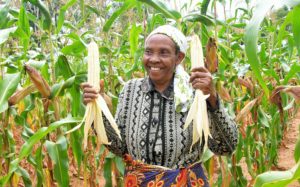
By Fred Deya,
Kenya is among African countries whose food security has been thwarted by huge post-harvest losses with over 30% of the farm produce get lost during transportation, in the field or in stores, agricultural experts revealed.
Delegates and Agricultural experts from African countries had a two-day forum in Nairobi, Kenya to have way forward on how to control post-harvest losses and come up with policies and strategies to tackle losses after harvest.
In reference to African Union (AU), Malabo declaration 2014; the post-harvest loss reduction agenda targeted the reduction rate of post-harvest losses for at least the five national priority commodities, possibly for the 11 AU agriculture priority commodities.
The workshop was graced by a number of agricultural experts and delegates from African countries including Kenya, Zambia, Zimbabwe, Nigeria, and Tanzania participated in a two-day open forum organized by African Union Commission in collaboration with Food and Agriculture Organization (FAO) and Rockefeller Foundation (RF).

Agriculture is the backbone of most of the African countries’ economy, the crackdown to curb food loss is seen as a common goal. The key stakeholders gathered to develop policies and strategies. Each country to have its own specific plans to reduce post-harvest losses, following 2014 Malabo declaration on Africa Enhanced Agricultural Growth and Transformation (3AGT).
Kenya is on the peek to adapt its strategies to control the post-harvest loss since 2015 with expected plans in place to control the loss up to 50% by 2025.
As echoed by Dr. Janet Edeme, African Union Commission head of Rural Economy and Division during the workshop, Post-harvest losses are directly linked to threats on food and nutrition security among Africans, saying “Post-harvest losses rob Africans their basic commodities-rich in body nutrition distance to just reduction of the total amount and quality of food available. The losses also worsen the already poverty-stricken Africa’s rural economies, eroding income generation along the food value chain, hindering food accessibility and sustainability of food and nutrition”.
Janet added that one out three of produced food for human consumption is lost or get wasted in the farm after the harvest. This could be due to poor harvest techniques or tools, or negligence.
In Kenya alone, about 20% of cereals are lost in transportation before reaching the market. This is exclusive of food waste, making it a high figure to comprehend.
 Food waste is that food that gets lost but fit and quality for human consumption, never get consumed but discarded, before or after spoils.
Food waste is that food that gets lost but fit and quality for human consumption, never get consumed but discarded, before or after spoils.
Richard Lesiyampe, Kenya’s Principal Secretary in the Ministry of Agriculture, Livestock and Fisheries officially opened the meeting with reckoning remarks: “Kenya’s government is committed to reducing post-harvest losses to 5% from the current 30%. The government welcomed learning and sharing ideas and experiences on the best policies and practices relevant to tackling post-harvest losses”.
In sub-Saharan Africa, 50% of fruits and vegetables, 40% of roots and tubers and 20% of cereals, legumes, and pulses are lost before hitting the market. This is connected to the recent years’ problems on food safety threats, contributed to post-harvest losses.
Piers Simukin, Senior programs coordinator at FAO confirmed the commitment of his organization. He said that there is a rolled out program that gears towards creating awareness on farmers about the importance of careful handling of the harvests. The program urges all farmers to be keen on proper drying of grains in order to get to the market at its best condition.
“There is a developed program by FAO to help farmers understand the benefits of proper storage, hence controlling post-harvest losses”, said Simukin.
Agricultural experts at the forum came together with a common agenda of corporation among the African countries to develop policies and strategies to curb the post-harvest loss problem quickly.
The outcome of the forum will lead or showcase a strongly built coordination of food loss reduction initiatives and improved alignment to the Malabo Declaration 2014 Implantation Roadmap. This will thereafter improve the capacity of African Union Member States in the design and implementation of food loss reduction policies, strategies, and related investment.













